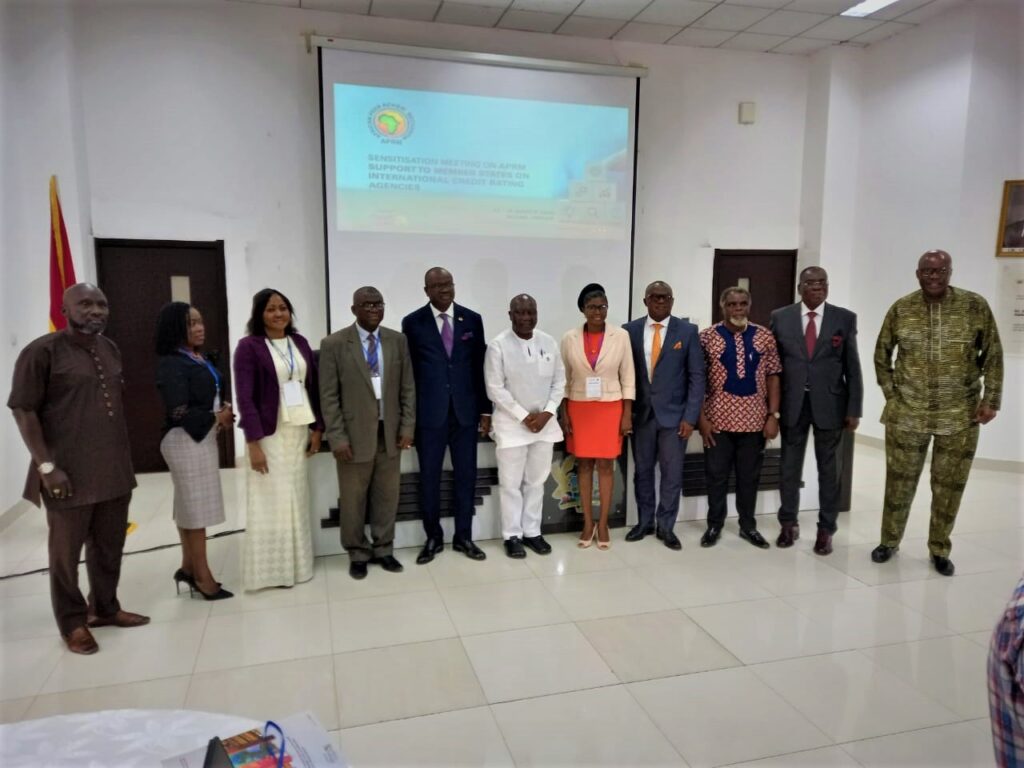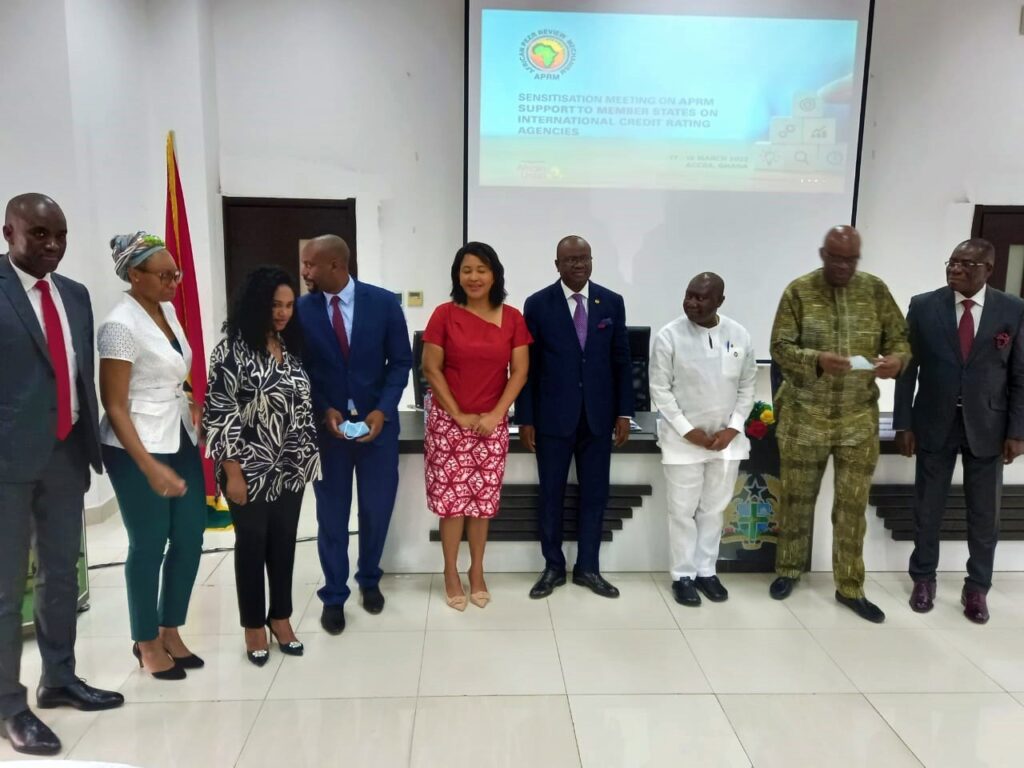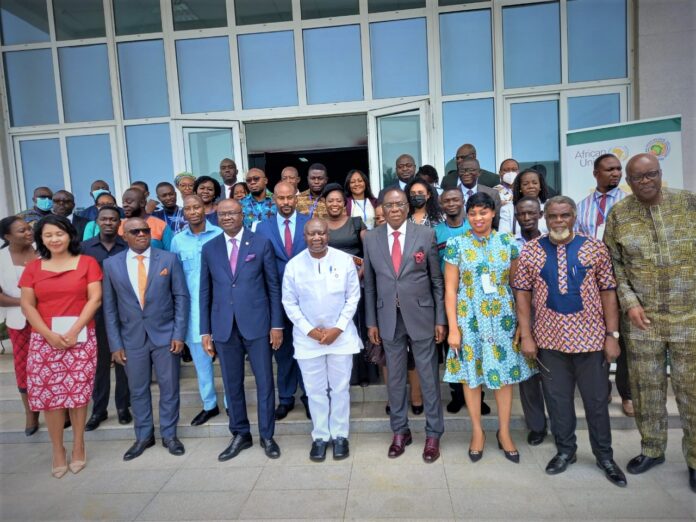A Two-day stakeholder Sensitization Workshop on the African Peer Review Mechanism (APRM) support for African Union (AU) member countries on International Credit Rating was opened in Accra on Thursday at Ghana’s Ministry of Foreign Affairs and Regional Integration.
The APRM is an African-owned and African-led platform for self-assessment, peer-learning, and experience-sharing in democracy and good governance, in full respect for democratic principles, human rights, rule of law, the acceleration of political, social, and economic integration in Africa.
The Meeting on International Credit Ratings will inform key stakeholders in Ghana about the APRM work on supporting countries in the area of international credit ratings.
It will further discuss the challenges faced by Ghana during its sovereign credit rating assessments and in implementing rating recommendations.
The participants are private sector entities, Institute of Directors’ members, policymakers, regulators, Chambers of Commerce, and other relevant stakeholders in Accra.
The main aim of this engagement is to improve the outcomes of future credit rating reviews through enhancing the engagements between international rating agencies and the representatives of the government.
Also, the Sensitization on African Principles and Guidelines on Corporate Governance is aimed at raising awareness and promoting good corporate governance practices in Ghana.
The meeting will further inform and promote the relevant stakeholders in Ghana on the recently developed African Principles and Guidelines on Corporate Governance.
The purpose of the sensitization workshop is to inform key stakeholders of the APRM work on credit ratings and to discuss the challenges and offer support to Ghana in its pre-rating preparatory phase, facilitate a systematic credit rating assessment exercise, manage the post-rating appeals and the implementation of admissible recommendations.
This is aimed at improving the outcomes of future credit rating reviews for through enhancing the engagements between international rating agencies and the representatives of the government.
The specific objectives are as follows;
Sensitize the government of Ghana of APRM work on credit rating
Sensitize various sectors for a coordinated approach on policy position
Assess the challenges faced by government and stakeholders on credit ratings, Assess the preparedness and coordination of stakeholders in Ghana to adequately engage ratings agencies in upcoming credit rating assessment exercises.
Assess the National Treasury’s strategy on credit ratings, Assess the implementation of credit rating review recommendations, Assess the regulation of the credit rating industry.
Addressing the official opening ceremony, Ghana’s Minister of Foreign Affairs and Regional Integration, Hon. Shirley Ayorkor Botchwey in a speech read on her behalf said the importance of credit ratings for individuals is straight forward in that, it ascertains whether or not an individual will be able to pay back a loan.
She added, similarly, for companies and sovereigns, it is supposed to show their ability to meet principal and interest payments on their debts and if the borrower will honour its debt obligations as agreed.
“Investors, therefore, rely on the ratings given by the credit rating agencies in making investment decisions. So, a favourable rating may attract foreign direct investments to a country while a low credit rating or relegation of a country from a high rating to a low rating can discourage investors from purchasing the country’s bonds or making direct investments in the country,” she said.
She added that “However, as sovereign states, we realise that the modalities that impact the outcome of ratings do not truly reflect our situation given the dynamism and highly nuanced political economy climate in Africa. Over the past two decades, it is evident that the changes in credit ratings of African countries does not always reflect the average improvement in political, economic and social indicators.”
She further lamented that sovereign rating statistics show that the international Credit Rating Agencies have downgraded more countries than they have upgraded in Africa and today, this rating is worsened by the Covid-19 pandemic.
“It is unfortunate that these credit rating agencies still remain the best available source of credible risk information for emerging economies to access international capital despite being accused of contributing to the global financial crises around the world at different points in history.
The United Nations, among other institutions, have recognised and criticised the deficiencies in methodologies, operations, and regulation of these credit rating agencies. However, in the quest for either improving or maintaining good credit ratings African governments have subjected themselves to the fiscal and monetary policy recommendations by the three international Credit Rating Agencies (CRAs). Consequently, any government that crafts an economic policy that contradicts the recommendations of the three international CRAs suffers the loss of being downgraded.”
The minister said these dynamics have ultimately shifted the regulation of national economies from the governments to the credit rating institutions and has presented a situation where African developing countries do not have full control in crafting policies that would provide essential goods and services to its citizens.
“It is therefore not surprising that African governments that chose to provide social interventions to its citizens to support them through Covid-19 pandemic, were all downgraded. We saw Standard & Poor’s downgrade warning to South Africa over its 500 billion rand ($30.8 billion) coronavirus package which was meant to be productive spending on protecting jobs, creating employment and assisting business enterprises.
We also saw, Moody’s downgrade of Ghana due to the ‘pandemic induced revenue underperformance’. In contrast, ratings of the West have been largely maintained with only a reduction in their outlook. This trend of unfavourable ratings against most African countries despite changes in the economic or political climate clearly shows the need to have our very own credit rating institution which is African-grown, African-led and African-owned.”
She recalled that as far back as 2016, a proposal was made by H.E Dr. Babacar Ndiaye, the former President of the African Development Bank at the 4th General Assembly of the Forum of Former African Heads of State and Government – Africa Forum held in Addis Ababa.
This proposal she mentioned explored the possible role of the APRM as the Continental Rating Agency and I add my voice to his call.
She said the adopted agenda at the 25th APR Forum of Heads of States and Government, held in Nairobi in August 2016 advocated for the APRM to develop APRM Support to Member States concerning regional and international ratings agencies.
“This has enabled the APRM to track the practices and impact of Credit Rating Agencies and I must applaud the APRM on being the African voice coming out to insist that Egypt’s current long-term foreign currency sovereign credit ratings by Moody’s and S&P Global be upgraded to a BB- rating class to reflect the country’s current creditworthiness.
And also, for denouncing Moody’s inaccurate downgrade of Ghana from B3 to Caa1. These few instances show that APRM has been vocal in its routine review of rating outcomes assigned by international credit ratings agencies on African countries, and we are excited to see what the future holds.”
She urged all participants and stakeholders to extensively engage during the two-day sensitization APRM and experts particularly on various issues regarding Credit Rating Agencies.
“I further charge you to ensure that you make solid recommendations that will help member states going forward,” Hon. Ayorkor Botchwey admonished.











































